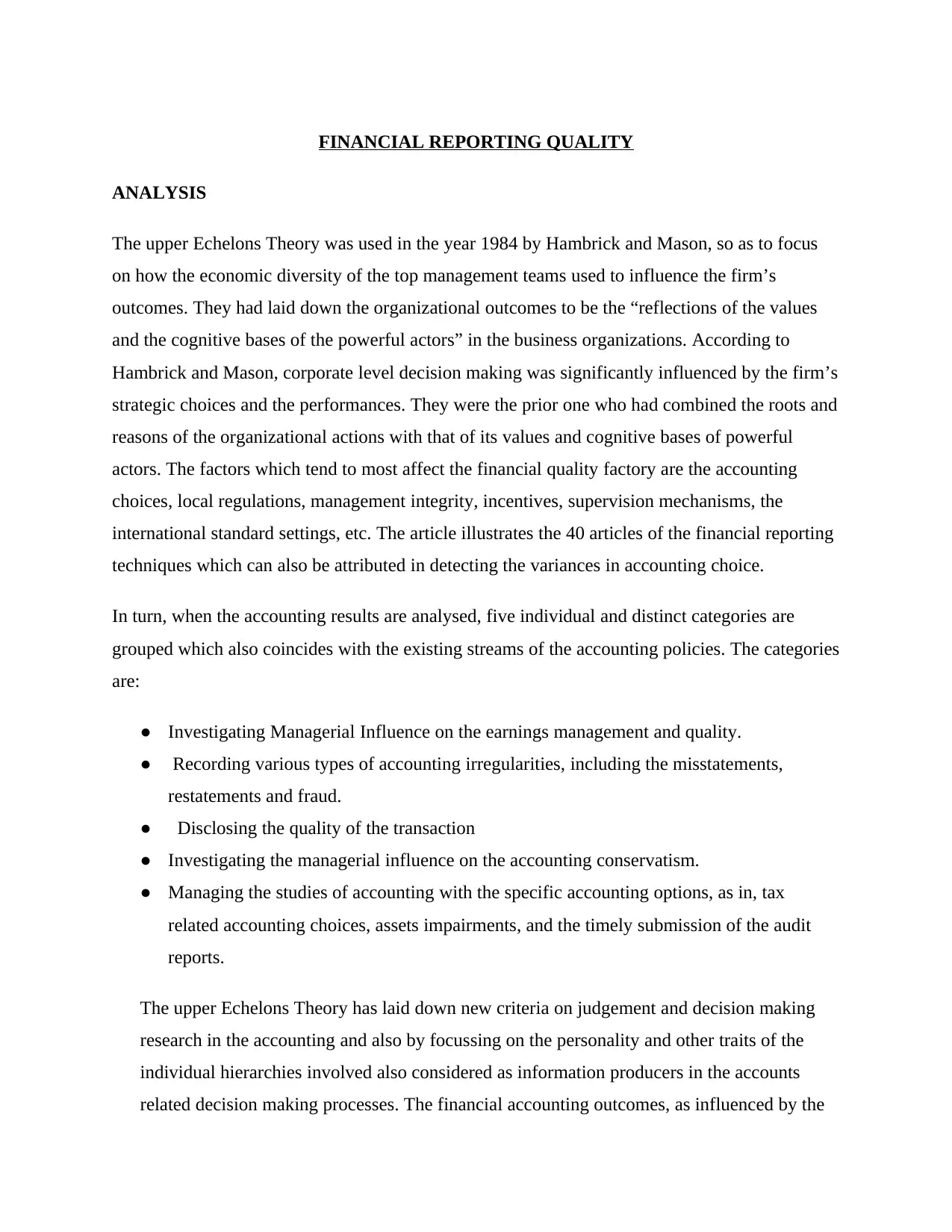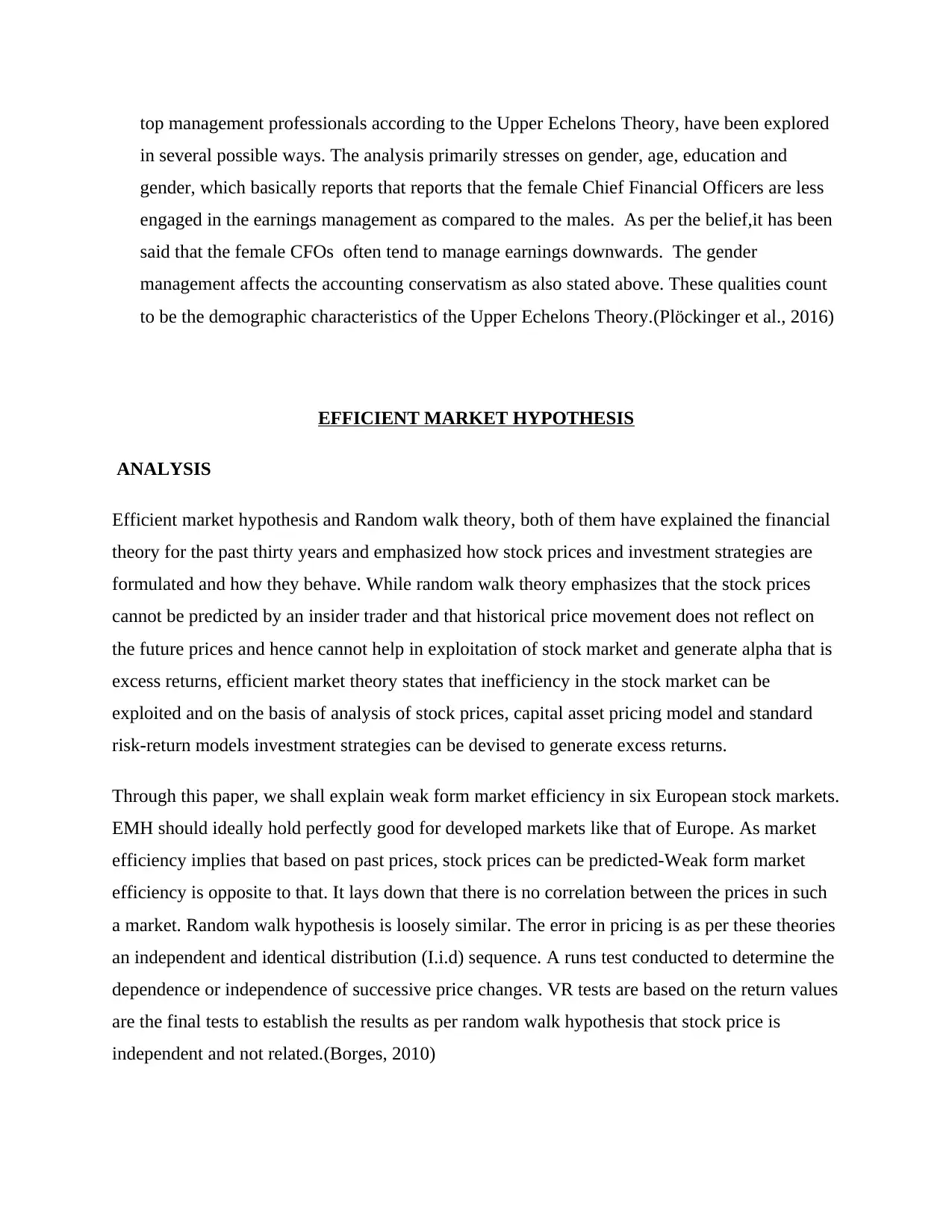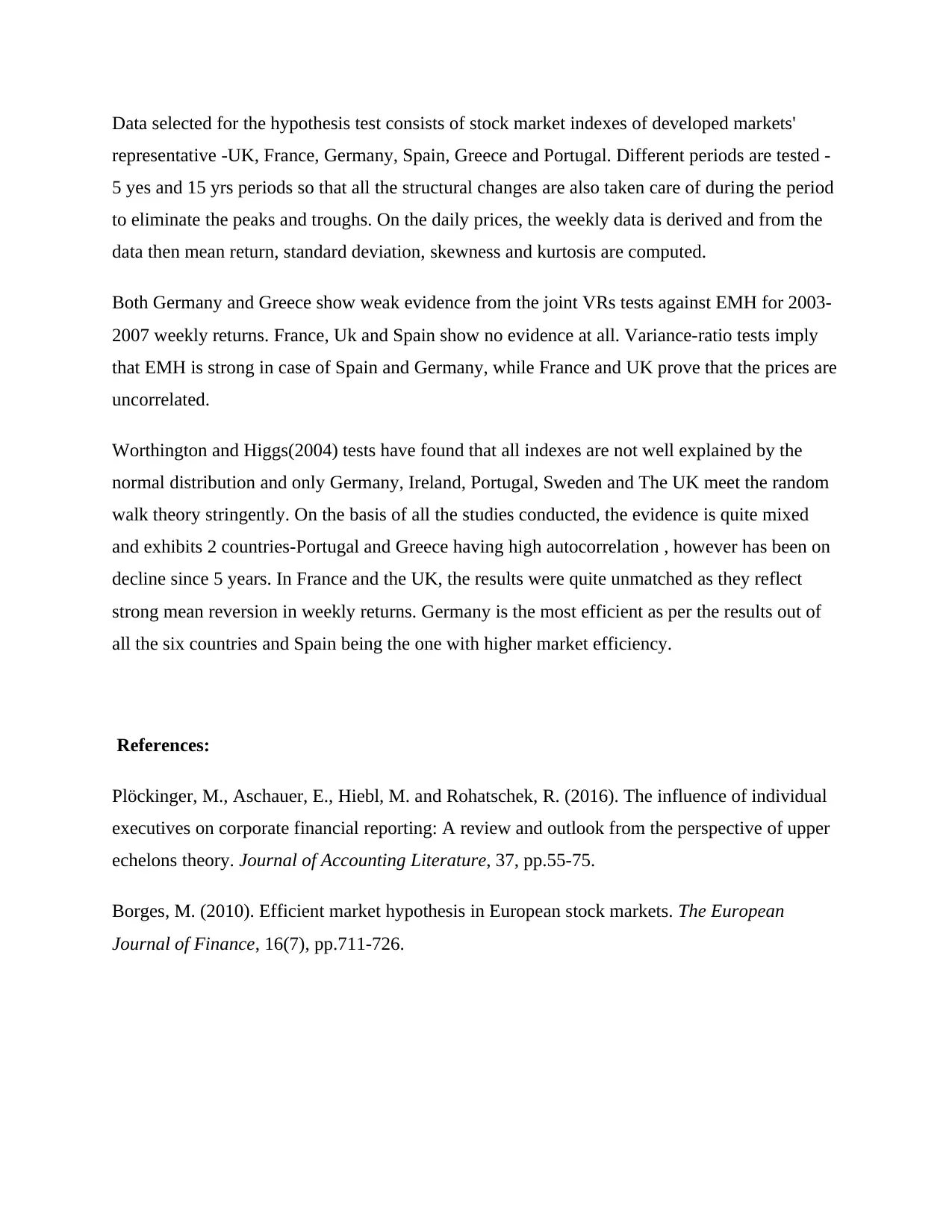Financial Reporting Quality, Market Efficiency: A Comparative Analysis
VerifiedAdded on 2022/11/09
|3
|1064
|96
Report
AI Summary
This report analyzes two key areas: financial reporting quality and market efficiency. It begins by examining the Upper Echelons Theory, which explores how top management teams influence firm outcomes through their values and cognitive bases, particularly impacting financial reporting choices like earnings management and accounting conservatism. The report also investigates the Efficient Market Hypothesis (EMH) and the Random Walk Theory, using data from six European stock markets to test weak-form market efficiency. The analysis employs runs tests and variance ratio tests to assess the correlation of stock prices over different periods. The results show mixed evidence, with some countries exhibiting strong market efficiency while others display inefficiencies. The study highlights the importance of accounting choices, managerial influence, and the demographic characteristics of top executives in shaping financial reporting outcomes and market behavior.

FINANCIAL REPORTING QUALITY
ANALYSIS
The upper Echelons Theory was used in the year 1984 by Hambrick and Mason, so as to focus
on how the economic diversity of the top management teams used to influence the firm’s
outcomes. They had laid down the organizational outcomes to be the “reflections of the values
and the cognitive bases of the powerful actors” in the business organizations. According to
Hambrick and Mason, corporate level decision making was significantly influenced by the firm’s
strategic choices and the performances. They were the prior one who had combined the roots and
reasons of the organizational actions with that of its values and cognitive bases of powerful
actors. The factors which tend to most affect the financial quality factory are the accounting
choices, local regulations, management integrity, incentives, supervision mechanisms, the
international standard settings, etc. The article illustrates the 40 articles of the financial reporting
techniques which can also be attributed in detecting the variances in accounting choice.
In turn, when the accounting results are analysed, five individual and distinct categories are
grouped which also coincides with the existing streams of the accounting policies. The categories
are:
● Investigating Managerial Influence on the earnings management and quality.
● Recording various types of accounting irregularities, including the misstatements,
restatements and fraud.
● Disclosing the quality of the transaction
● Investigating the managerial influence on the accounting conservatism.
● Managing the studies of accounting with the specific accounting options, as in, tax
related accounting choices, assets impairments, and the timely submission of the audit
reports.
The upper Echelons Theory has laid down new criteria on judgement and decision making
research in the accounting and also by focussing on the personality and other traits of the
individual hierarchies involved also considered as information producers in the accounts
related decision making processes. The financial accounting outcomes, as influenced by the
ANALYSIS
The upper Echelons Theory was used in the year 1984 by Hambrick and Mason, so as to focus
on how the economic diversity of the top management teams used to influence the firm’s
outcomes. They had laid down the organizational outcomes to be the “reflections of the values
and the cognitive bases of the powerful actors” in the business organizations. According to
Hambrick and Mason, corporate level decision making was significantly influenced by the firm’s
strategic choices and the performances. They were the prior one who had combined the roots and
reasons of the organizational actions with that of its values and cognitive bases of powerful
actors. The factors which tend to most affect the financial quality factory are the accounting
choices, local regulations, management integrity, incentives, supervision mechanisms, the
international standard settings, etc. The article illustrates the 40 articles of the financial reporting
techniques which can also be attributed in detecting the variances in accounting choice.
In turn, when the accounting results are analysed, five individual and distinct categories are
grouped which also coincides with the existing streams of the accounting policies. The categories
are:
● Investigating Managerial Influence on the earnings management and quality.
● Recording various types of accounting irregularities, including the misstatements,
restatements and fraud.
● Disclosing the quality of the transaction
● Investigating the managerial influence on the accounting conservatism.
● Managing the studies of accounting with the specific accounting options, as in, tax
related accounting choices, assets impairments, and the timely submission of the audit
reports.
The upper Echelons Theory has laid down new criteria on judgement and decision making
research in the accounting and also by focussing on the personality and other traits of the
individual hierarchies involved also considered as information producers in the accounts
related decision making processes. The financial accounting outcomes, as influenced by the
Paraphrase This Document
Need a fresh take? Get an instant paraphrase of this document with our AI Paraphraser

top management professionals according to the Upper Echelons Theory, have been explored
in several possible ways. The analysis primarily stresses on gender, age, education and
gender, which basically reports that reports that the female Chief Financial Officers are less
engaged in the earnings management as compared to the males. As per the belief,it has been
said that the female CFOs often tend to manage earnings downwards. The gender
management affects the accounting conservatism as also stated above. These qualities count
to be the demographic characteristics of the Upper Echelons Theory.(Plöckinger et al., 2016)
EFFICIENT MARKET HYPOTHESIS
ANALYSIS
Efficient market hypothesis and Random walk theory, both of them have explained the financial
theory for the past thirty years and emphasized how stock prices and investment strategies are
formulated and how they behave. While random walk theory emphasizes that the stock prices
cannot be predicted by an insider trader and that historical price movement does not reflect on
the future prices and hence cannot help in exploitation of stock market and generate alpha that is
excess returns, efficient market theory states that inefficiency in the stock market can be
exploited and on the basis of analysis of stock prices, capital asset pricing model and standard
risk-return models investment strategies can be devised to generate excess returns.
Through this paper, we shall explain weak form market efficiency in six European stock markets.
EMH should ideally hold perfectly good for developed markets like that of Europe. As market
efficiency implies that based on past prices, stock prices can be predicted-Weak form market
efficiency is opposite to that. It lays down that there is no correlation between the prices in such
a market. Random walk hypothesis is loosely similar. The error in pricing is as per these theories
an independent and identical distribution (I.i.d) sequence. A runs test conducted to determine the
dependence or independence of successive price changes. VR tests are based on the return values
are the final tests to establish the results as per random walk hypothesis that stock price is
independent and not related.(Borges, 2010)
in several possible ways. The analysis primarily stresses on gender, age, education and
gender, which basically reports that reports that the female Chief Financial Officers are less
engaged in the earnings management as compared to the males. As per the belief,it has been
said that the female CFOs often tend to manage earnings downwards. The gender
management affects the accounting conservatism as also stated above. These qualities count
to be the demographic characteristics of the Upper Echelons Theory.(Plöckinger et al., 2016)
EFFICIENT MARKET HYPOTHESIS
ANALYSIS
Efficient market hypothesis and Random walk theory, both of them have explained the financial
theory for the past thirty years and emphasized how stock prices and investment strategies are
formulated and how they behave. While random walk theory emphasizes that the stock prices
cannot be predicted by an insider trader and that historical price movement does not reflect on
the future prices and hence cannot help in exploitation of stock market and generate alpha that is
excess returns, efficient market theory states that inefficiency in the stock market can be
exploited and on the basis of analysis of stock prices, capital asset pricing model and standard
risk-return models investment strategies can be devised to generate excess returns.
Through this paper, we shall explain weak form market efficiency in six European stock markets.
EMH should ideally hold perfectly good for developed markets like that of Europe. As market
efficiency implies that based on past prices, stock prices can be predicted-Weak form market
efficiency is opposite to that. It lays down that there is no correlation between the prices in such
a market. Random walk hypothesis is loosely similar. The error in pricing is as per these theories
an independent and identical distribution (I.i.d) sequence. A runs test conducted to determine the
dependence or independence of successive price changes. VR tests are based on the return values
are the final tests to establish the results as per random walk hypothesis that stock price is
independent and not related.(Borges, 2010)

Data selected for the hypothesis test consists of stock market indexes of developed markets'
representative -UK, France, Germany, Spain, Greece and Portugal. Different periods are tested -
5 yes and 15 yrs periods so that all the structural changes are also taken care of during the period
to eliminate the peaks and troughs. On the daily prices, the weekly data is derived and from the
data then mean return, standard deviation, skewness and kurtosis are computed.
Both Germany and Greece show weak evidence from the joint VRs tests against EMH for 2003-
2007 weekly returns. France, Uk and Spain show no evidence at all. Variance-ratio tests imply
that EMH is strong in case of Spain and Germany, while France and UK prove that the prices are
uncorrelated.
Worthington and Higgs(2004) tests have found that all indexes are not well explained by the
normal distribution and only Germany, Ireland, Portugal, Sweden and The UK meet the random
walk theory stringently. On the basis of all the studies conducted, the evidence is quite mixed
and exhibits 2 countries-Portugal and Greece having high autocorrelation , however has been on
decline since 5 years. In France and the UK, the results were quite unmatched as they reflect
strong mean reversion in weekly returns. Germany is the most efficient as per the results out of
all the six countries and Spain being the one with higher market efficiency.
References:
Plöckinger, M., Aschauer, E., Hiebl, M. and Rohatschek, R. (2016). The influence of individual
executives on corporate financial reporting: A review and outlook from the perspective of upper
echelons theory. Journal of Accounting Literature, 37, pp.55-75.
Borges, M. (2010). Efficient market hypothesis in European stock markets. The European
Journal of Finance, 16(7), pp.711-726.
representative -UK, France, Germany, Spain, Greece and Portugal. Different periods are tested -
5 yes and 15 yrs periods so that all the structural changes are also taken care of during the period
to eliminate the peaks and troughs. On the daily prices, the weekly data is derived and from the
data then mean return, standard deviation, skewness and kurtosis are computed.
Both Germany and Greece show weak evidence from the joint VRs tests against EMH for 2003-
2007 weekly returns. France, Uk and Spain show no evidence at all. Variance-ratio tests imply
that EMH is strong in case of Spain and Germany, while France and UK prove that the prices are
uncorrelated.
Worthington and Higgs(2004) tests have found that all indexes are not well explained by the
normal distribution and only Germany, Ireland, Portugal, Sweden and The UK meet the random
walk theory stringently. On the basis of all the studies conducted, the evidence is quite mixed
and exhibits 2 countries-Portugal and Greece having high autocorrelation , however has been on
decline since 5 years. In France and the UK, the results were quite unmatched as they reflect
strong mean reversion in weekly returns. Germany is the most efficient as per the results out of
all the six countries and Spain being the one with higher market efficiency.
References:
Plöckinger, M., Aschauer, E., Hiebl, M. and Rohatschek, R. (2016). The influence of individual
executives on corporate financial reporting: A review and outlook from the perspective of upper
echelons theory. Journal of Accounting Literature, 37, pp.55-75.
Borges, M. (2010). Efficient market hypothesis in European stock markets. The European
Journal of Finance, 16(7), pp.711-726.
⊘ This is a preview!⊘
Do you want full access?
Subscribe today to unlock all pages.

Trusted by 1+ million students worldwide
1 out of 3
Your All-in-One AI-Powered Toolkit for Academic Success.
+13062052269
info@desklib.com
Available 24*7 on WhatsApp / Email
![[object Object]](/_next/static/media/star-bottom.7253800d.svg)
Unlock your academic potential
Copyright © 2020–2026 A2Z Services. All Rights Reserved. Developed and managed by ZUCOL.
